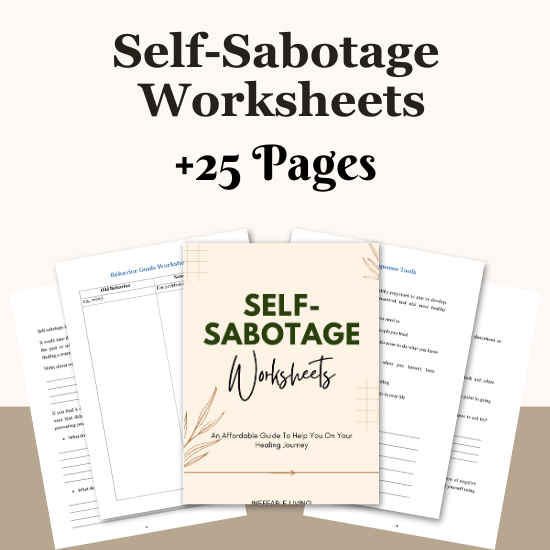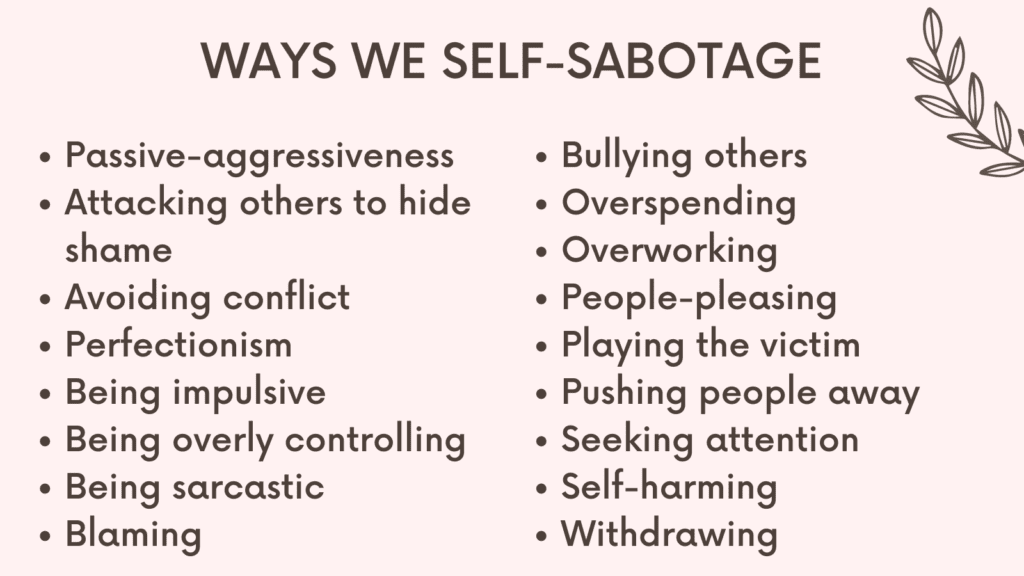You want to grow. You set the goal. You dream the dream. But just when things start to go well, you hesitate — or back out entirely. Maybe you procrastinate on something important, push away a healthy relationship, or convince yourself you’re not ready. You tell yourself you’re lazy or undisciplined. But the truth is deeper: self-sabotage often feels safer than success.
It may sound backwards, but for many people, failure feels familiar — and familiarity feels safe, even when it hurts. Understanding why you sabotage yourself isn’t about shame. It’s about uncovering hidden fears and meeting them with compassion so you can break the cycle.
Here’s why self-sabotage can feel safer than success — and how to start choosing something different.
What Self-Sabotage Really Is
Self-sabotage isn’t laziness, weakness, or a lack of willpower—it’s a protective pattern. It’s what your nervous system does when success feels more threatening than failure. It often looks like:
- Procrastinating right before big opportunities
- Quitting before things get good
- Dimming yourself to avoid standing out
- Creating drama or chaos before peace settles in
- Rejecting love, joy, or progress because they feel unfamiliar
You’re not destroying your progress—you’re trying to stay emotionally safe.
Related: Best 21 Self Sabotage Journal Prompts
Why Self-Sabotage Feels Safer Than Success
1. Success Threatens Your Identity
If you grew up believing you’re not good enough, lovable, or capable, then success challenges your self-concept. It contradicts the internal story you’ve told yourself. And sometimes, failure feels less painful than facing the discomfort of rewriting that story.
2. You’re Afraid of What Success Might Cost
More visibility. More pressure. More expectations. Success often comes with higher stakes — and if you’ve been hurt in the past for standing out or taking risks, your nervous system may associate success with danger. Sabotage becomes self-protection.
3. You’re Bracing for the Crash
If life has taught you that good things don’t last, success can feel like a setup for disappointment. You may push it away before it can leave you — just to feel in control of the letdown.
4. You Feel Safer in the Familiar
You may be miserable where you are, but it’s a misery you understand. Growth requires uncertainty, and for trauma survivors or people who lived in unpredictable environments, uncertainty can feel terrifying — even if it leads to something better.
5. You’re Addicted to Struggle
If you’ve spent your life fighting to survive or prove your worth, peace might feel unfamiliar — even boring. You may subconsciously recreate drama or failure just to feel “normal.”
Related: Best 7 Self Sabotage Books
6. You Don’t Feel Worthy of Success
Deep down, you may believe you haven’t earned the right to feel proud, happy, or loved. So you reject the opportunities that challenge that belief — even if you long for them.
7. You Fear Being Seen
Success often brings attention. If you’ve spent your life trying to stay invisible to avoid judgment or rejection, being seen — truly seen — can feel deeply unsafe. Sabotage helps you retreat back into the shadows.
8. You’re Trying to Stay in Control
Failure on your own terms may feel safer than success that could be taken away. Sabotage becomes a way to control the outcome — even if that outcome is pain.
Related: Best 15 Books About Fear
How to Start Healing the Pattern?
Recognizing that your sabotage is rooted in protection, not laziness, is the first step. From there, healing means gently reintroducing your nervous system to the idea that it’s okay — even safe — to expand.
1. Slow Down When You Feel the Urge to Quit
Notice what you’re feeling underneath the resistance. Ask yourself:
What am I afraid will happen if this actually works?
2. Make Success Feel Safer
Visualize yourself succeeding and still being loved, grounded, and free. Anchor the image in calm, not pressure. Let your body learn that success doesn’t have to mean abandonment or chaos.
3. Rewrite the Old Beliefs
Challenge stories like “I don’t deserve this” or “I’ll mess it up anyway.” Replace them with compassionate truths like:
“It’s okay for me to grow.”
“I don’t have to suffer to be worthy.”
4. Practice Small Wins
Start with low-stakes goals that challenge the sabotage pattern in manageable ways. Let your nervous system adapt to success in gentle doses.
5. Be Kind to the Part That Sabotages
That part isn’t your enemy — it’s a younger version of you trying to stay safe. Speak to it gently. Let it know:
“We’re not in danger anymore. You don’t have to protect me from this.”
6. Work With a Trauma-Informed Therapist
If sabotage is a recurring pattern, especially tied to childhood trauma or emotional neglect, professional support can help you get to the root — and release the fear of expansion.
Related: Overcome Koinophobia – the Fear of Being Ordinary

Conclusion
Self-sabotage isn’t about weakness — it’s about survival. It’s your nervous system choosing familiarity over freedom, because somewhere along the line, safety meant staying small.
But you’re not that child anymore. You can choose differently now. You can let success feel safe, soft, and sustainable. And you can remind yourself, every step of the way: I’m allowed to grow. I’m allowed to win. I’m allowed to be okay.



